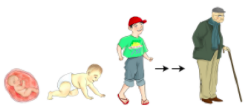21 Nov 2016 - Insights in repairing DNA-protein crosslinks.
Genomic instability is a hallmark of cancer and aging. Scientists at Goethe University Frankfurt now discovered the molecular cause for genetic instability in patients suffering from a rare segmental progeroid syndrome named Ruijs-Aalfs syndrome. The syndrome leads to premature aging and early onset liver cancer.
“Until now, it was unclear how these patients, carrying mutations in the metalloprotease SPRTN, succumb to the disease”, comments Ivan Dikic, director of the Institute of Biochemistry II.
Dikic’s team has now shown that SPRTN is required for repairing a specific type of DNA damage, so called DNA-protein crosslinks (DPCs). Crosslinks are extremely toxic for cells as they prevent proper chromosome duplication. Cells deficient in SPRTN functions are sensitive to chemotherapeutic treatments which usually induce crosslink formation.
The results reported by the Frankfurt team follow in the footsteps of a breakthrough discovery by the late Stefan Jentsch (Max Planck Institute of Biochemistry, Munich), who was the first to identify a dominant role for the yeast Wss1 protease in resolving DNA-protein crosslinks. SPRTN is now the first mammalian protease for which such an essential function was shown. Moreover, SPRTN cannot functionally complement Wss1 function in yeast, indicating to the presence of a family of DPC metalloproteases with related functions.
The results of this study have been published in eLife online (Lopez-Mosqueda et al.). Two additional reports from the Francis Crick Institute in London (Stingele et al., Mol Cell 2016) and from Oxford University (Vaz et al., Mol Cell 2016) describe similar roles for SPRTN in mammalian DPC repair.
